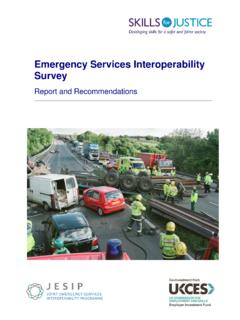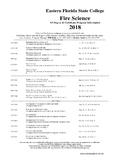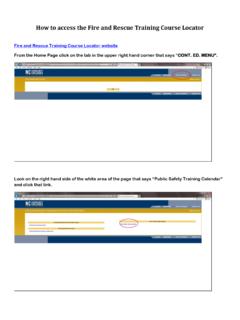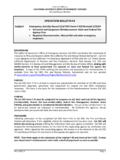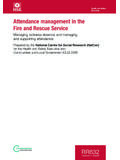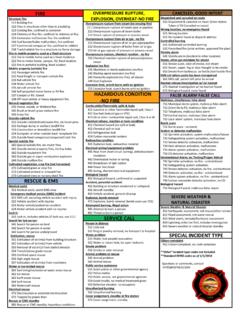Transcription of Command Training, Assessment, and Qualification …
1 Command training , assessment , and Qualification in the fire and Rescue Service Page 1 of 12 Command training , assessment , and qualifications Guidance Document November 2013 Command training , assessment , and Qualification fire and Rescue Service Guidance Page 2 of 12 Command Qualifications and Command training Guidance Document November 2013 Contents Introduction Purpose Background National Occupational Standards (NOS) Command Qualifications Awarding Centres and qualifications All Hazard Command Tactical Adviser Non-technical skills and PQAs Development and maintenance Quality Assurance Glossary Page 3 of 12 Command Qualifications and Command training Guidance Document November 2013 Introduction In September 2013, the Operational Competence Guidance (OCG) document was launched as part of the fire Professional Framework (FPF).
2 The FPF is the outcome of a lengthy review of training and development requirements in the fire and rescue service that was previously presented as the Organisational Competence Framework. The OCG was developed with the support of both the Operations Directorate and the People and Organisational Development (POD) directorates through a steering group that included both CFOA Ops and POD directors. The guidance provides UK fire and Rescue Services (UK FRS) with an operational competence framework for operational firefighters and commanders to ensure that they can safely and effectively apply the necessary skills, knowledge and understanding in an operational environment.
3 It is a guidance document for FRS and is not intended to dictate or prescribe how competence should be achieved or how training and development programmes must be delivered; that is a matter for each individual FRS. The OC guidance defines Core Operational skills and knowledge that a Firefighter or Operational Commander requires, these are represented using the fire engine graphic below and include: Driving Command and Control Breathing Apparatus Hazardous Materials Working at Height Water/Water Safety Extrication/Rescue Casualty Care Page 4 of 12 Command Qualifications and Command training Guidance Document November 2013 Purpose The following information refers to the topic of training , assessment and qualifications associated with the skills and knowledge requirements of effective Command and control.
4 The National Command and Control Working Group (NCCWG), that sits within CFOA s National Operations Committee s Operational Effectiveness work-stream, produced this document titled Command Qualifications and Command training in the UK fire and Rescue Service to assist in providing a recognised standard and model by which all UK FRS would train, develop and assess their incident commanders. Command Qualifications and Command training in the UK fire and Rescue Service should both inform and support the Operational Competence Guidance. Command Qualifications and Command training in the UK fire and Rescue Service provides: Background to Command training .
5 An overall framework for the delivery of Command training with the aim of achieving consistent and standardised levels of Command at all levels and in all UK FRS. An overview of the concept of an All Hazards Commander and All Hazard Command training . Detail of the relationship between technical and non-technical skills and the role they play in effective incident Command . An understanding of the importance of developing Command skills: via acquisition, application and maintenance through continued professional development. Detail of the four levels of Command and Command qualifications. Detail of the importance of delivering the qualifications through an accredited Awarding Centre.
6 Details of what constitutes a suitable assessor, with particular reference to advanced and strategic level assessment . Background Since 2007 Skills for Justice (subsequently Skills for fire & Rescue, which now sits within Skills for Justice) have worked with CFOA to develop four levels of Command Qualification . These subsequently received approval by OFQUAL before being launched by Pearson, Edexcel and SFJ Awards. The result is four levels of Command , which are underpinned by four Command qualifications applicable to the fire and rescue service. The development of Command training across UK FRS has resulted in a variety of different Command courses becoming available.
7 Some courses are generic, whereas others have been focused on specialist areas at specific levels of Command responsibility (the CBRN Gold course for example). In many cases, the focus has been on the specialist technical area rather than on the subject or skillset of Command itself. Page 5 of 12 Command Qualifications and Command training Guidance Document November 2013 The nationally recognised levels of Command provide an opportunity to focus attention on Command competence itself, rather than concentrating on the incident types. The National Occupational Standards (NOS) for Command and Control provide a structure that enables UK FRS to undertake and deliver a consistent level of training to a common standard.
8 National Occupational Standards (NOS) The NOS broadly consists of eight separate units across all four levels of Command . Trainees, students and/or candidates are required to demonstrate competence in two broad areas set against Guided Learning Hours.* Knowledge and Understanding is assessed in a controlled learning and development environment. This may be achieved in a number of different ways including oral or written examination or through assignment work followed up with professional discussion. Command Competence is assessed in a simulated work environment covering both the Incident Commander and Sector Commander roles. *Guided learning hours are the times when a tutor, trainer or facilitator is present to give specific guidance towards the learning aim for a programme.
9 This definition covers lectures, tutorials and supervised study in, for example, open learning centres and learning workshops. It also includes assessment by staff where learners are present. It does not include time spent by staff marking assignments or homework where the learner is not present. To ensure that the Command NOS remain current and fit for purpose, indicative review periods have been set for consideration by Skills for fire and Rescue and the National Occupational Committee. It is important that the NCCWG and NCCUG are consulted in any further review process. Command Qualifications There is a difference between being qualified to Command and being competent to Command .
10 If an individual passes a Command assessment and gains the national Qualification , he/she still needs to apply their learning and demonstrate competence. It is likely that this will be supported by continual development within his/her home UK FRS (the individual should be able to consistently demonstrate his/her ability to Command against the standard). Individual UK FRS are responsible for the maintenance of such competencies through the monitoring of the individual s performance. The four qualifications of Command form the basis for all development and assessment of commanders, with the four levels corresponding to the Qualification and Credit Framework (QCF) as detailed below: Level 1 Award in Initial Incident Command (QCF level 3) in fire and Rescue Services.


